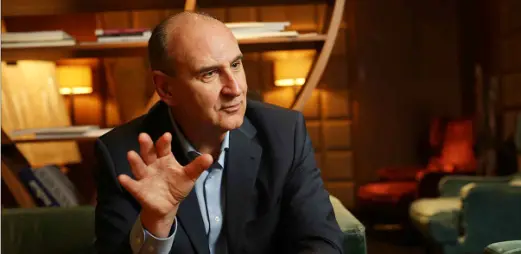THE WORLD’S #1 EXECUTIVE COACHING AND BUSINESS COACHING BLOG SINCE 2017.
Business Coaching for Small Business Owners & Entrepreneurs
March 29, 2017 | Category: Blog, Expert Interview Series
Dr. Greg Chapman is a small business advisor, speaker, and the award-winning author of The Five Pillars of Guaranteed Business Success. We had a chance to speak with the creator of Empower Business Solutions to hear his thoughts on the components of a successful small business.
Why are you so Passionate About Small Businesses?
Prior to working with small business owners, I was a corporate executive with responsibilities ranging from new business development to operations. I worked internationally in the US and the UK for seven years before returning to Australia to start my own business. This was one that reflected my desired lifestyle, rather than working for others to support theirs!
With that experience, it was easy for me to compare the passion and commitment of the owners of small businesses, who have created something from nothing, with executives and managers who were just occupying a role created by someone else (just hired guns). I admired what these business owners created, and many of them had no formal business training. They are like athletes with natural abilities who are able to go a long way just on their own talent and drive; but to succeed at the highest levels, even these individuals seek out a coach. I love working with these owners, filling in their knowledge gaps, and helping them achieve their ambitions.
What are Some of the Common Challenges Expressed to you be Small Business Owners?
The most common challenge for small business owners is time, which forces them to choose between focusing on operational matters and working on their business. Unfortunately, too many choose the former, because if they don’t pay attention to day-to-day issues and dealing with problems as they arise, their customers become unhappy and could potentially leave them. As a result, owners find it difficult to be away from their business for any length of time, as they are typically micro-managers. In addition, they struggle to attract the best buyers for their products and services: the people who most value what they provide, and are prepared to pay for it! This is because their marketing is passive rather than strategic.
What Must Small Business Owners Accomplish in Order to Achieve Success in his or her Business?
In my book, The Five Pillars of Guaranteed Business Success, the Pillars are: Planning, Marketing, Systems, People, and Discipline. This starts with a clear vision for their business – namely where they want it to be in, say, 5 years, and the steps they will take to achieve that goal. This ensures that they have a clear focus and every decision by the owner becomes much easier to make. Marketing is all about finding and attracting those who want to buy what you want to sell for the price you want to charge. Unless the reason for that is that you are the cheapest, you’d better have very clear points of difference that benefit the buyer.
Systems are essential for any business that wants to consistently produce products to a standard that its customers require at a cost that the business can afford. Systems allow owners to delegate and outsource work with the confidence that quality will be maintained. All businesses depend on people. Even one-man bands depend on suppliers for some things. In order for delegation and outsourcing to work, everyone supporting the business needs to understand their role and what a good job looks like. However, in order for an owner to have a business that doesn’t depend on them being there every day, he or she must be able to manage the business and those within it by reports. The last ingredient is the owners themselves. It is the owners’ discipline driven by their vision that achieves their ambitions. Without this discipline, their vision is a dream – and how often do they come true?
What are some simple online tactics that almost any small business owner can do in order to raise awareness or increase sales prospects?
The most important factor for success online is being found, because if no one knows about you, nothing else you do matters! So a strategy for being found is crucial. You could be discovered organically (SEO), with online advertising or social media, or a combination of all of these. The key is to be focused on whom you are trying to attract, which online marketing enables in a way never possible previously.
Once the buyer reaches your website, they need to be reassured that they are in the right place and that you are who they have been looking for. Ensure that your landing pages give that reassurance, or else they will be gone in 60 seconds. Having found you, make sure they don’t leave empty-handed. That doesn’t mean you must make a sale on their first visit, but you can provide an “ethical bribe” with some information they would value in exchange for their email address. Failing that, you can tag them for an online remarketing campaign so you stay “top of mind” until they are ready to buy. Once you have their contact details, have a strategy to stay in touch to build your relationship with them.
What advice might you give an entrepreneur-turned small business owner who has to begin leading and overseeing employees for the first time in his or her career?
Even before you bring the first person into your business, have a clear idea of their role and the skills, experience, and personality of the individual. A wrong hire is very costly. Have a plan to train the person in your systems from day one. Make sure that they know what a good job looks like. Once staff are trained, incentive schemes can be a great way to ensure focus and provide a reward for effort. Then set up a reporting process for your employees that provides accountability so that you don’t need to micromanage them. Finally, share your vision with your employees and celebrate wins with them.
What types of leadership skills are needed for a small business to take the next step and become a larger business?
The single most important leadership skill is communication. Without the clarity of good communication, employees can easily become demotivated, which can easily infect everyone and lead to a toxic culture. The ability to communicate is essential if the owner wishes to share their vision and enthusiasm with their staff. Being able to delegate enables your staff to grow with your business.
This should be coupled with constructive feedback to staff on performance that is designed to encourage and motivate. Owners don’t have all the answers, so a culture of creativity should be developed along with problem-solving skills. Ultimately, owners need to develop a teamwork culture where employees support each other in the achievement of the goals of the business and celebrate successes with a sense of fun.
If a business owner were to say to you, “If I borrow money for expanding my business but fail to do so, I’ll be in debt and could lose the business altogether,” how might you respond? There is always a risk when you borrow money. The risks could be either internal or external. These risks should be identified up front, along with mitigation strategies to address the risks. There should be an investment plan with clear milestones against which progress is measured. With such a plan, early warning signs of problems will be evident and corrective action taken in a timely fashion to avoid disaster. Risk can never be completely eliminated, but careful planning can reduce the impacts even for events outside of the owners’ control.
What do you foresee for the future of small businesses and the people who own and operate them?
Never before have the barriers to entry to business been so low, particularly online. Young people will often work for someone else for a few years, see a better way of doing things, and leave to start their own business. No one expects to stay in one job for their life. Instead, they expect to have multiple careers. With larger businesses being focused on automation and cost reduction, the opportunities are in small business which are the true incubators of innovation. How many businesses with great ideas have you seen been bought out by larger businesses – with the former owners leaving with a large check and an even larger smile on their face!




